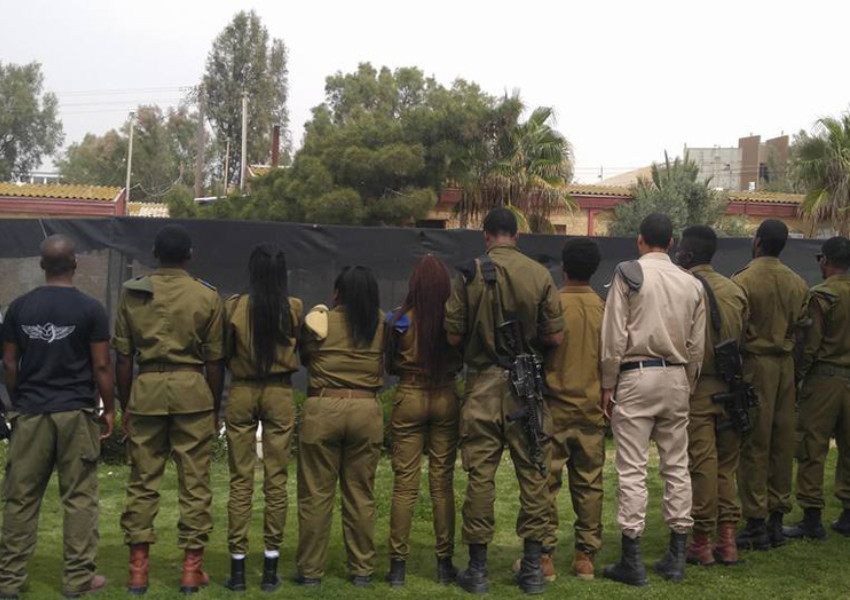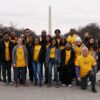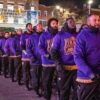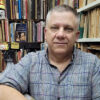On the night of February 21, 2015, Cpl. Toveet Radcliffe was on duty in a guard post on an Israel Defense Forces base north of the Israeli city of Ashdod. Sometime before midnight, she was shot in the head. Her lifeless body was discovered by another soldier around midnight.
The IDF initially told Radcliffe’s family—former members of the African Hebrew Israelite community who live in Dimona—that she was found dead in her bed on the base. Hours later, military personnel returned to the family home to report that she shot herself while performing guard duty.
It has been more than three years since that tragic night. Many articles have been published about the case. An hour-long documentary titled “Who Shot Cpl. Toveet Radcliffe?” aired on primetime television in Israel. An IDF investigation was conducted and closed, with the specially-appointed military judge ruling this past January that “the deceased’s death was self-inflicted.”
Yet many inside the African Hebrew Israelite community still do not accept that Radcliffe killed herself—willingly or accidentally as a result of mishandling her rifle, as the military judge suggested might have been the case. They point to numerous flaws in the IDF’s investigation, including the failure to call a forensics team to process the scene at the guard post, the loss of evidence, and the failure to investigate claims that a soldier in Radcliffe’s unit had made threatening comments to her. Moreover, they say she was happy and loved life.
In response to what they believe is a cover-up of Radcliffe’s murder, the African Hebrew Israelites have leveled harsh public criticism against the army. At a recent press conference at the community’s compound in Dimona, Nasik Immanuel Ben Yehuda—a member of the AHIJ’s ruling body known as the Holy Council—said: “There’s this nagging feeling that things would be different if Toveet wasn’t a little black girl from Dimona, and that somehow she’s less important than someone else. And something’s wrong with that picture.”
Some community members reportedly said they would not send their children to the military because of how this case was handled, potentially upending an arrangement between the community and the state of Israel dating back to 2004.
Military service has always been a sensitive topic for the African Hebrew Israelites. As a pacifist, vegan group whose members believe that they hold the keys to world peace and physical immortality, their participation in the Israeli army—in any army, for that matter—seemingly violates some of their most sacred ideals. However, the Hebrews take a great deal of pride in their military service. More than 300 young men and women from the community have been inducted into the IDF to date and served the country they call home. Many have fought on the front lines in wars against Israel’s enemies. Two even went on to become officers.
Why do they serve in the army if it violates their beliefs? What follows is an analysis of the community’s participation in the Israeli army, based on extensive research I conducted in Israel for my master’s thesis, entitled “Yah’s Exemplary Soldiers: African Hebrew Israelites in the Israel Defense Forces” (Tel Aviv University, 2015).
***
The first AHIJ youth enlisted in the IDF in 2004, following a decision by then-Interior Minister Avraham Poraz the previous year to grant community members permanent residency status. At the time, the leadership readily agreed for their members to be drafted. Poraz recalled: “We wanted it, they wanted it, it’s good for everybody. I don’t think that it would have been smart from an Israeli point of view to let them stay without military service.” In fact, community leaders allowed both male and female members of military age to be conscripted; this was a highly unusual arrangement, since the female members of every other non-Jewish group in Israel are automatically exempt from serving in the army. (Today, community leaders admit that in lieu of military service they would prefer for their daughters to do national service, which involves volunteer work in schools, hospitals, and other public institutions.)
The decision by community leaders to accept the burden of military service as a condition of their status upgrade appears to have been guided by several factors. The first was a desire to improve their standing in Israeli society. After decades of living on the margins of society, Ben Ammi and his deputies had reached the conclusion that entering the IDF was the best way to tie up their destiny with the state’s and to secure long-term residency in their putative ancestral homeland. (Military service also provides a direct path to citizenship for soldiers and their family members.)
Sar Avraham Ben Israel, the father of the first Hebrew soldier to enlist in 2004, explained that the community wanted to demonstrate its commitment to the security of the state and that, in return, they expected to receive greater government support. He explained: “We knew that there would be benefits to go and dig deeper into the society and become a part of the state, and that would assist us because we’ve been struggling for so long. We knew that that would help us, not so much that we needed that, but it would make things a lot easier.” Thus, the Hebrews agreed to military service in part for the benefits it would bring, seeing it as a transactional relationship with the state.
The second factor guiding the decision was the existential imperative to defend their adopted homeland. Sar Avraham explained that despite their moral opposition to armed conflict, the Hebrews could not ignore the very real threats to Israel’s security and, ultimately, to their own safety. “We don’t believe in no fighting and no killing,” he told me. “On the other hand, we’re living in a country that’s at war. It’s surrounded by enemies, talking about annihilating [it]. So at that point you don’t have a choice but to defend yourself.”
Sar Ahmadiel Ben Yehuda, the community’s “minister of information,” emphasized how closely the Hebrews identify with the Israeli state when it comes to security matters: “We went through this dynamic back in the Gulf War with Saddam Hussein, and that first scud missile being sent into Israel did not discriminate relative to whoever it would land upon. So any attack on the state of Israel is regarded as an attack on the community.” Left unstated was the fact that the community has been directly affected by terrorism: Aharon Ellis, the first Hebrew born in Dimona, was killed by a Palestinian gunman along with five other people at a bat mitzvah at which he was performing in Hadera in January 2002.
The third factor was a feeling of societal obligation to contribute to the national defense. Sar Avraham explained: “We can’t sit back and allow our brothers and sisters in the country to send their daughters and sons out there and sacrifice them on behalf of their nation and we don’t give anything.” When his son, Oriyahu Ben Israel, was inducted into the IDF in 2004, Ben Ammi was quoted in the Israeli newspaper Haaretz as saying: “From now on we will be an inseparable part of Israeli society. Until now, other people sent their kids to protect us. Now it’s time for us to pay our debt.” Therefore, the Hebrews conceive of their community as bound by the national social contract that requires non-Haredi Jewish Israelis to serve in the IDF.
The fourth factor was the community’s ideological commitment to ensuring Jewish control over the land of Israel, which they see as preferable to Arab control. Sar Ahdeev Ben Yehuda, the community’s liaison to the IDF, framed this commitment in spiritual terms: “We identify with the state and with the Biblical covenant that this land, from the Nile to the Euphrates, was given unto the seed of Abraham. We don’t see any other national entity having the spiritual mandate over this land.” Sar Ahmadiel clarified further: “We do believe that the autonomy over this land should be in the hands of Israelites. Our ideals are in harmony with Hebrews, Israelites, Judaism, there’s more connection there, than on the other side of the equation.”
***
Although AHIJ leaders had compelling reasons for accepting IDF service as part of their status upgrade, their entry into the military was neither straightforward nor uncontroversial. Sar Ahdeev called it “one of the greatest challenges” facing the community since their exodus from the United States. Some families quietly questioned the rationale behind the decision, given the obvious contradictions between their ideology and the exigencies of military service in a country that has fought four major wars since the Hebrews began enlisting and is the target of daily terrorist threats. In addition, members of other U.S.-based Hebrew Israelite congregations loudly condemned them for collaborating with the “Zionist” regime and contributing directly to the oppression of the Palestinians, whose plight is sometimes compared to that of African Americans under the system of racial discrimination known as Jim Crow and to blacks under apartheid in South Africa.
Community leaders do acknowledge the contradictions of their participation in the IDF. Sar Ahdeev explained: “We don’t think anybody should [have to] place their children in the military. We are sons of peace, and that’s a part of our vision, that we have harmony in society, peace, and love and brotherhood. But given the current realities and circumstances, we try to make our soldiers understand that there’s things that we have to go through that may not necessarily be part of our vision.”
One of the initial concerns that leaders had regarding military service was how the young recruits would be able to maintain their culture and avoid the community’s taboos. There were extensive meetings between community leaders and senior military officials in the months leading up to the first enlistments in 2004. Initially, the army agreed only to allow Hebrew soldiers to wear cloth boots instead of the standard-issue leather ones. In response to soldiers’ complaints that they were not able to fulfill other communal obligations while serving in the army, Sar Ahdeev began supplying new inductees with a letter providing details about the community’s lifestyle and holy day guidelines. Soldiers reported that some commanders read the letter and honored its requests, while others completely disregarded it.
In late 2013, after a handful of soldiers petitioned the army for greater leniencies, citing those given to members of other minority groups, the IDF recognized the community as one of its “special populations.” Today, Hebrew soldiers are exempt from active duty on Shabbat (because they fast) and on all of their holy days. As vegans, they are eligible to receive extra salary so they can supplement their diet with food prepared at home. In addition, since the Torah forbids wearing mixed fabrics, they are permitted to wear cotton uniforms at all times. Some individual male soldiers have also managed to get exemptions from shaving their heads and beards—an exemption given primarily to religious Jewish soldiers—because doing so violates Hebrew customs.
Another of the leaders’ concerns was that the youth would be exposed to negative influences and forbidden practices, such as smoking and eating meat. Sar Ahmadiel Ben Yehuda, the community’s “minister of information,” acknowledged that the young Hebrew inductees would be exposed to many practices that are forbidden: “We know that some of them will dabble and experiment in some areas that were forbidden and unknown to them, in many cases, but I always say my job is to be here when they come back to their senses.” In fact, some adults within the Hebrew community see the experience of IDF service as a spiritual test for their children. Sar Ahdeev said: “We knew going in there that our children were going to have to be rooted. We told them, this is your test, now Yah’s gonna test you, and you’re gonna be put on the line to see if you’re gonna maintain your allegiance to what you know and your identity, or not.”
On the other hand, the Hebrews also see IDF service as an opportunity to spread their doctrine. Just as Israeli society inevitably has an influence on the Hebrews, Sar Ahmadiel said, so too do they have an influence on Israeli society. He recalled a conversation with Ben Ammi in 2004 in which they discussed how the media coverage surrounding their entry into the IDF, and especially their special needs as vegans, might encourage the Israeli public to explore healthier lifestyle choices. (Indeed, veganism has become more popular in Israel in recent years, and the Hebrews take some credit for this trend.) However, the Hebrews do not actively proselytize while in the IDF, and to date there have been only a few Jewish Israelis who have officially joined them.
***
The question of whether or not Hebrew soldiers should be allowed to join combat units was very contentious, and it appears to have driven a wedge between Ben Ammi and Asiel Ben Israel, the group’s former “international ambassador.” In October 2011, Asiel rebuked Ben Ammi on a Chicago-based public access television show for selecting a group of youth to form a Nahal brigade, which combines combat service with agricultural training. Many of those soldiers saw action during Operation Summer Rains in the summer of 2006; one nearly lost his life during a battle with Hezbollah forces in Lebanon when a shell landed right next to him, killing a comrade.
Of Ben Ammi’s decision to send Hebrew soldiers into the infantry, Asiel said: “Now, that was not brought to the people for a full, open discussion, because we went in there saying that is something that we would not do. There’s no way that we gonna fight no Palestinians about no issue about land. It was a contradiction of our purpose and our being. We went there as the peacemakers.” To drive home his point, Asiel quoted from Scripture: “Blessed are the peacemakers, for they shall be called the sons of God.” That one of Ben Ammi’s closest advisers would speak against him in such a pointed and public way reflects how contentious the issue of army service, and specifically of combat duty, was for some members of the community. The Nahal brigade that Ben Ammi created ultimately disbanded after several soldiers dropped out.
Today, Hebrew youth are discouraged from joining combat units, though they are not explicitly forbidden from doing so. Rather, they are taught that their purpose is to be, in the words of Sar Ahdeev, “a spiritual element in the army that would help to reinforce the IDF.” Even before they joined the IDF’s ranks, the Hebrews viewed their contribution to the army, and to the state at large, as spiritual in nature. They believe they are partly responsible for Israel’s dramatic victory in the Six Day War, pointing out that the war was fought and won as the group’s vanguard members were starting their exodus from the U.S., thus activating a spiritual force that bolstered Israel’s military campaign.
Despite their myriad concerns about sending their children to the IDF, the adults of the community are, by and large, proud that their soldiers are serving their country and representing their community in a positive way. They honor their soldiers by praying for them, paying tribute to them during holy day celebrations and community gatherings in Dimona, and allowing them to eat for free at the community’s restaurants. They believe that since Ben Ammi himself encouraged service in the IDF, it must be in the best interest of the community.
In the wake of Toveet Radcliffe’s tragic death and the army’s bungling of its investigation, some in Dimona are beginning to have doubts.





NO non citizen should serve in the IDF unless they are able to get equal consideration.
I think if there can be a choice, Hebrews will choose not to join IDF.
This was done due to insufficient avenues to choose.